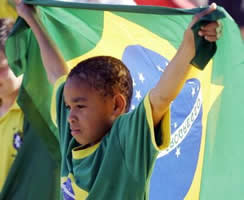I'm still figuring out the next leg of my travels. And while looking through old files on my computer I came across a short piece I wrote almost 5 years ago about my first international experience (sans parents) when I spent a summer in Costa Rica teaching English. The article was my first stab at travel writing and was published in the illustrious Ron Brown Scholars Newsletter. If you want to read the story in all of its pdf greatness, click
here (There are some pretty cute pictures of the kids I was teaching.) But I have also included the article below:
***
I am not a morning person. At home and at school I typically press the snooze button on my alarm a dozen times. I need to take a fifteen-minute shower before I can create cogent sentences, and am still not very friendly until I have completely digested a full breakfast.
Unfortunately, Costa Ricans love the morning. Before the sun reaches the horizon, the call of the family rooster breaks the night’s silence. Feeling left out, all the neighborhood dogs chime in and contribute to the daily morning symphony that, without fail, broke my peaceful slumber every day I spent in Central America. My host mother was always scurrying around the house at what I considered the wee hours of the morning, preparing for the next day. My host father was usually working in the fields of coffee and sugar cane before I even groggily realized the day had begun. During the daily ritual in which I struggled to stay awake while eating my breakfast, my host sister was typically already leaving for school with her classmates. This, however, was especially problematic because I was usually the person teaching her first hour English class.
Despite my loathing of early mornings, my teaching schedule in Costa was the easiest adjustment I needed to make. Simply getting to my home in Pacayitas de La Suiza, a tiny town in the central highlands of Costa Rica, was an adventure in and of itself. I remember myself struggling in the dust and heat of a blazing Central American afternoon, trying to find my bearings while dragging around an unnecessarily large suitcase. I darted in and out of speeding cars through streets and alleys seemingly unregulated by traffic lights and signs. I asked for directions in halting Spanish and then feigned understanding when their responses came either too quickly or in an incomprehensible accent. I worried that I may never find my bus stop, and might become an American casualty forever lost in the confusion of the Costa Rican streets.
Finally, like all my travels in Costa Rica, I made it to my destination. I became more confident with my Spanish and eventually learned to move to the rhythm that embodies life in the small nation. This typified my experience this summer. As my American sensibilities began to wear off and I let myself become immersed in my environment, things began to make sense. I no longer worried if all my students fully comprehended object pronouns and verb conjugation. Late buses or forgotten appointments did not get under my skin. My daily thirty minute walk through mountainous terrain became customary, and the morning crow of the rooster actually grew to become comforting in its regularity.
Costa Rica made me adaptable. I learned how to traverse new cultural guidelines and societal standards while still being myself. I became flexible, understanding, and appreciative of all the little pleasures of life in a tiny rural village. Soon I forgot about the long lines at the lone public phone in the town. The constant buzzing of insects began to fade into the background. To the slight chagrin of my supervisor at school, I even began to personify the extremely laid back sensibility that defines life for most in Costa Rica.
Slowly but surely, I became more than just the American in town. I became a fixture at town bailes (parties) and was a regular in the daily mejingas (soccer matches) in the plaza. Students began to solicit my conversation for more than just naughty English words or help with their assignments. As I grew in tune with the daily flow and gossip of the town, I was treated as a confidant and as an equal. I was involved in everyday life in the community, and at brief instances, I feel many people almost began to forget I was a foreigner. And inevitably, as I was readying myself to leave, I realized that I had built genuine relationships in my community. Now as I reminisce on my time spent in Costa Rica, it almost seems as if I am remembering an alternate lifetime. Off in a distant land I picture my other family back home in Pacayitas, living without me and adjusting to the lack of my presence. I feel connected to another world. This process of growth and complete international immersion has given me a depth of perception unavailable in the relative isolation I experienced in America. Costa Rica has given me a taste of the international experience. Now that I feel at home in both the United States and my small community of Pacayitas, where am I going to explore next?








